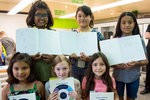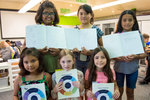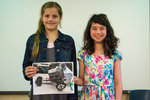


At Washington Elementary School in Centralia, the three R’s are reading, writing, and robots.
Fourth-grade students under the tutelage of teacher Kate Steward made up the Washington Elementary Robotics Team that competed in the rookie division at the South Sound STEM Robotics Invitational on June 3 in Olympia.
Despite being up against teams of middle- and high- school students, the Mini Tigers walked away as the grand champions of the division. The duo of Paige Ricks and Abigail Schultz also won the award for top dragster car among rookie competitors.
Steward began teaching robotics skills to her students eight years ago as part of an after school club. This school year was the first time she incorporated the lessons into her general mathematics curriculum using LEGO Mindstorms kits purchased using grant funding obtained by herself and the Centralia School District.
Washington Elementary School students have won the rookie division four times since Steward began taking teams to the competition in Olympia, but this was the first one that featured only fourth-grade students.
“They had to learn that robots will only do what they’re programmed to do and to think not in terms of what’s wrong, but how to make things work,” Steward said. “I think the practice of actually learning to program the robots helped with the mathematical concepts, because they had the practice with the robots first. … The kids had to learn how to collaborate and cooperate by adapting to use ‘our’ ideas instead of just ‘my’ ideas as well as how to learn through failure.”
The robots designed and programmed by the students were able to successfully complete tasks that ranged from using a marker to draw specific angles to picking up and throwing ping-pong balls over a barrier. Competitors were not allowed to use controllers or joysticks to make their creations perform as advertised — all tasks were done autonomously.
When asked about their experiences on Thursday afternoon, the children all voiced their delight at having learned such a unique skillset while also studying topics such as math, science and engineering. Students wrote down ideas and catalogued their progress in notebooks designed to help them solve problems they encountered during the months leading up to the competition.
“It was fun to learn math while doing our projects,” said Lua Hudson. “We also got to learn skills we can use in the future.”
Steward and the school district hope to expand the reach of the robotics program as soon as the 2019-2020 academic year. She is leading a summer course for other fourth-grade teachers in the district to learn how to use the equipment and lesson plans.
With the school district set to transition to a K-6 configuration in conjunction with the opening of two new elementary schools next fall, there have also been discussions about how to create a mentorship program for the older students to work with younger ones. Steward will be moving to the new Fords Prairie Elementary School, but plans to continue her practice of mixing the standard curriculums with circuitry.
“With the STEM-specific classrooms at the new schools, a goal would be to have school-wide access to the robot kits,” she said. “We’ll be working to get more grants for larger-scale purchases for that purpose.”